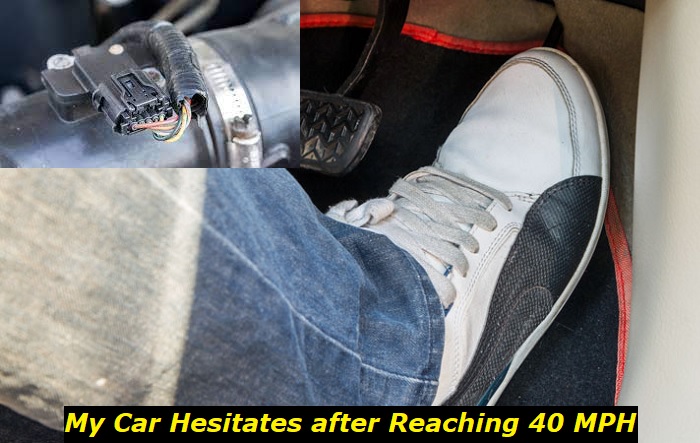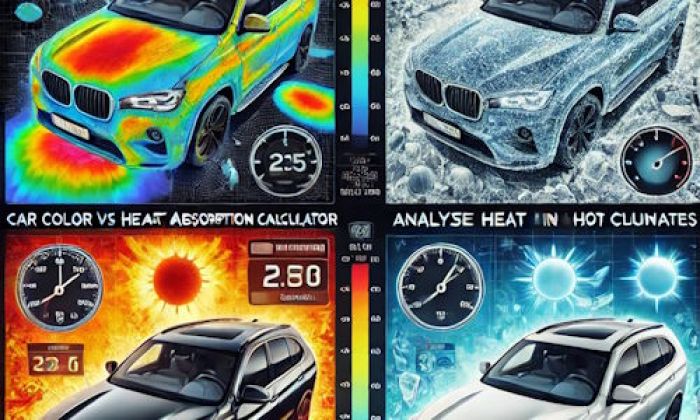The airflow sensor in your engine is like a bouncer at a high-end club. It ensures just the right ratio of air and petrol are making it into the engine.
Engine power problems highlights
- Level of urgency:Medium
- DIY inspection:Possible but may be complicated
- DIY repair:Sometimes, possible
- Cost of repair:$200 - $650
- Can you drive?In most cases, yes
- Commonreasons:A largelist of reasons, including fuel and air supply, electronics, glitches, but not limited to those.
- Ways to fix:Use code scanner to locate the problem and solve it

Car Stalling At 40 Mph: Red Flags
1) Having Difficulty Acceleration
If your car's acting like a stubborn mule refusing to budge past 40 mph, your transmission is likely waving a red flag. Remember, transmission issues can sneak up on you at any speed, depending entirely on which gear has decided to call it a day.
When you're trying to cross the 40 mph mark, your engine might sound like it's throwing a tantrum, revving up without a corresponding increase in speed. It's like your car is trying to belt out a high note but is stuck on a flat one.
Persisting on this could result in your engine getting serious burnout. Oddly enough, your car might seem as right as rain at slower speeds, but don't let that lull you into a false sense of security.
2) A Decrease In Speed
There are instances where the transmission might turn traitor, sabotaging your car's ability to keep up the pace. Imagine this: you're rolling at a steady 40 mph when, out of nowhere, your car decides to take a leisure break.
The engine's humming along, none the wiser, even as your speed nosedives, no matter how much you pump the pedal. Your transmission throws you a bone, saying, "Hey, something's amiss here."
This tantrum from your transmission might be momentary, like a summer storm. But don't be fooled. If it's happened once, it's likely to pull this stunt again. Before your car's tantrums escalate, get it into the service bay for a thorough once-over.
3) Kicking When Shifting Gears
A troubled transmission is anything but subtle. It tends to give you a rough shake when you're shifting gears. The action heightens as you edge towards 40 mph - the engine's RPMs escalate like a band hitting a high note. Normally, the sound would ease as the transmission settles into gear and the engine's RPMs scale down.
But with a moody transmission, you may experience a sudden jolt, like your car hitting a speed bump, followed by a loud "thud," resembling a hammer strike. If this keeps happening, it's a loud and clear sign that your transmission is slowly wearing out.
Signs Of Power Loss
It's not just annoying when your vehicle starts acting like it's in a bad mood at traffic signals. It's a sign that it needs some care. Spotting a problem is only the start; the real hurdle is figuring out what's causing it.
There could be many reasons behind the loss of power, so it's important to identify the exact system causing it.
1) Airflow Sensor
Your airflow sensor is the quarterback of your engine's team - if it starts fumbling or gets muddied up, your engine's game plan goes awry.
This results in power loss when trying to pick up the pace. Even when your vehicle is fired up and ready to go, it might behave like a reluctant mule, its 'Check Engine light stubbornly glowing, signaling a potential fumble in the play.
2) Catalytic Converter
The catalytic converter is a vital air traffic controller for your engine. If it fails or gets clogged, it's like a runway jammed with planes, blocking the free flow of air through the engine and causing a dip in power.
Apart from this, you might notice your car's idle turning as erratic as a caffeine-fueled squirrel or the temperature spiking higher than usual.
To determine if your catalytic converter is functioning at its best, your mechanic can check with a vacuum gauge, like an air traffic controller assessing the runway's state.
3) Timing Belt Or Chain
If your timing belt or chain is as worn out as a marathoner at mile 25, you'll find it tough to keep your engine revving at its best. Typically, a dissonant clatter from the engine's front section is your clue that the timing's hit a sour note.
4) Ignition System
A faltering ignition system could mean occasional power outages and hitches when trying to fire up your vehicle. It's as if you're trying to start a campfire with damp matches.
A tune-up might give it the kickstart it needs, but getting a seasoned mechanic to give the whole system a once-over with the right diagnostic tools is crucial.
While modern tune-ups need fewer component swaps, a meticulous check of the fuel injection system should be on the agenda.
5) Leak In The Vacuum System
An air-to-fuel ratio leak in your vehicle is like an unwanted guest at a party, throwing your computer's ratio regulation efforts off balance and leading to a power dip. Such a leak usually sets off the 'Check Engine light, like a security alarm triggered by the intruder. Listen closely under your car's hood, and you might hear a hissing sound from the engine area - that's your leak trying to snake its way through.
6) A Failing Fuel Pump Or Clogged Filter
Fuel pumps in your vehicle act like diligent mail carriers tasked with fuel delivery. However, like anyone, they can get worn down with time or encounter a logjam, prohibiting the free passage of fuel.
If your fuel pump starts to falter or struggles to coax fuel through the filter, your car might react in several ways. It could produce a coughing sputter at high velocities, pretend to choke as you hit the gas from a standstill, or downright refuse to cooperate while trying to scale an incline.
So, here is a quick rundown of the points I've mentioned:
- Having Difficulty Accelerating
- A Decrease In Speed
- Kicking When Shifting Gears
- Signs Of Power Loss
- Airflow Sensor
- Catalytic Converter
- Timing Belt Or Chain
- Ignition System
- Leak In The Vacuum System
- A Clogged Fuel Filter
What Should You Do If Your Car Unexpectedly Stops Its Acceleration on the Road?
If your vehicle decides to take an unexpected break from acceleration, light up your hazard signals as a beacon for fellow drivers. Subsequently, scout for a secure spot to veer off the road.
The road's shoulder, public parking spaces, or off-road turnouts could be your safe havens, provided they don't put you or other drivers at risk.
If your vehicle decides to play the tortoise, crawling way below the minimum speed limit, you might need to call in for a tow or roadside assistance to avoid becoming a road hazard.
In case you missed the points, below is a quick overview of what you're expected to do when your car stops on the road unexpectedly.
- Use hazard signals if the car stops.
- Find a safe place off-road.
- Choose shoulder, parking, or turnouts.
- Call tow if the speed drops drastically.
Is It Dangerous To Drive Too Slowly?
Leisurely cruising is usually no biggie, but being that notorious slow coach disrupting the ebb and flow of traffic, that's another story! So, don't turn a deaf ear to this speed concern-it's more serious than you'd reckon.
As per the wisdom of various legal hotshots, being a turtle on wheels can be as treacherous as gunning it like a bat out of hell.
When you're driving very slow, other drivers are coerced into your slow-paced ballet, raising the stakes for potential whoopsies, especially if they have to change their speed or change lanes to match your crawl.
In a good number of states, trudging along at a snail's pace gets tagged as a minor traffic violation, thanks to its innate threat. But hold your horses, it isn't just a finger-wagging affair.
The fallout could span from fat fines to those hair-raising traffic tickets. As those at the Insurance Information Institute warn, such road rule flubs could even pump up your insurance premiums.
In a cruel twist of fate, your snail's pace could spiral into a fender bender due to some serious vehicle malfunction.
Final Thoughts
In wrapping up this automobile issue, let's take a moment to acknowledge what you've just learned. You now know what to look for when your car decides to put on a show at 40 MPH - a not-so-welcome magic trick, right?
From mass air flow sensors playing maestros to power transmissions trying their best as stage managers, you've peeped behind the curtain of your car's performance.
So next time your car decides to stop accelerating at 40 mph, you're not going to be just a helpless driver. You'll step up, armed with your newfound wisdom, to guide your car back to its encore performance.
About the authors
The CarAraC research team is composed of seasoned auto mechanics and automotive industry professionals, including individuals with advanced degrees and certifications in their field. Our team members boast prestigious credentials, reflecting their extensive knowledge and skills. These qualifications include: IMI: Institute of the Motor Industry, ASE-Certified Master Automobile Technicians; Coventry University, Graduate of MA in Automotive Journalism; Politecnico di Torino, Italy, MS Automotive Engineering; Ss. Cyril and Methodius University in Skopje, Mechanical University in Skopje; TOC Automotive College; DHA Suffa University, Department of Mechanical Engineering






Add comment